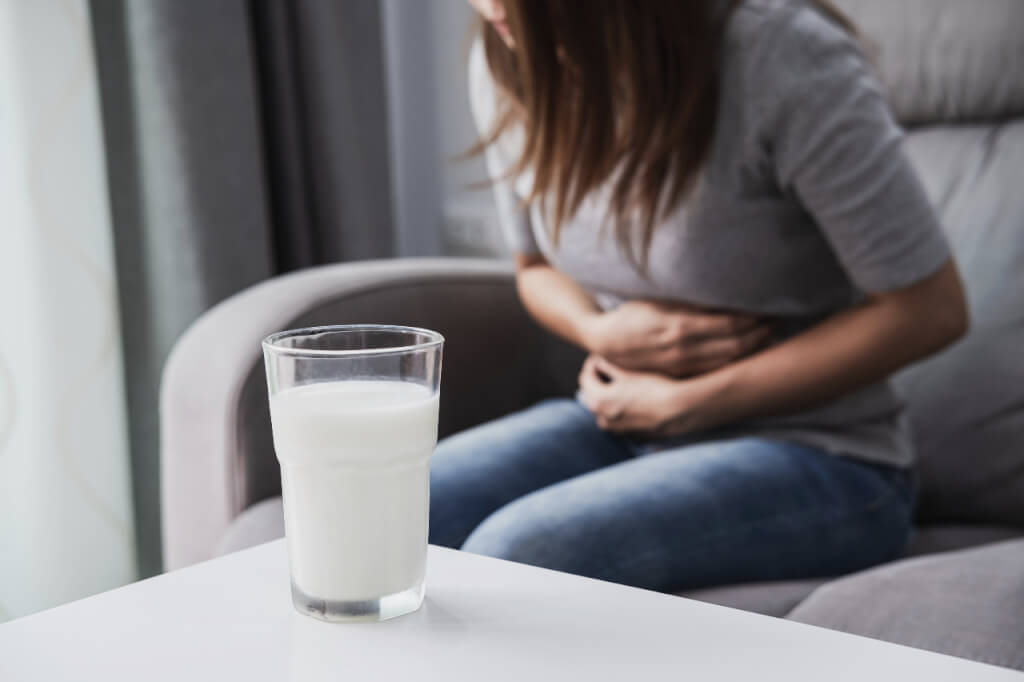Advertising Disclosure
What does lactose intolerance really mean?

Do you have stomach pain after eating dairy products? Do you experience diarrhea or other digestive problems with milk, cheese and yogurt? Lactose intolerance could be the reason for your symptoms. You’ve probably heard this term before, but what is lactose intolerance really? Lactose intolerance is the inability to digest lactose, a sugar found in milk and dairy products. Common symptoms include digestive health issues such as abdominal pain, bloating, diarrhea, nausea and vomiting. There’s no reason for embarrassment if you’re lactose intolerant. Believe it or not, there are plenty of other people who share your problem. Approximately 65% of all humans are unable to properly digest lactose after infancy.
What causes lactose intolerance?
Lactose intolerance comes down to an inability in the small intestine to produce the enzyme lactase. Lactase breaks down lactose into glucose and galactose, which are then easily digestible. If you don’t have enough lactase, you’ll experience unpleasant symptoms after consuming dairy products containing lactose. Your stomach lining and intestinal walls contract. You may suffer bloating or nausea. Lactose-intolerant individuals should avoid all types of cow’s milk. Talk with your doctor if you think that you might be suffering from some form of food allergies. Lactose intolerance is often a genetic trait, but it also can result from gastroenteritis.
What can lactose intolerant people eat and what can’t they eat?
It can be tricky, but there are a few things that lactose intolerant people should eat. Dairy products like yogurt and cheese have lower levels of the lactose enzyme–so those might work well for you when consumed in moderation. If you’re avoiding dairy all together, there are plenty of dairy alternative milks to try like soy milk, almond milk, and cashew milk.
If you are like many lactose intolerant people, you can enjoy dairy products by taking a lactase enzyme supplement, like Lactaid, when eating dairy. This supplement adds the necessary lactase that your body isn’t producing to break down the lactose.
How is lactose intolerance diagnosed?
A doctor or nutritionist can diagnose lactose intolerance through a breath or blood test. However, many doctors can tell just by talking to you about your symptoms. Once you get a diagnosis, your practitioner will possibly recommend an avoidance diet for up to two weeks and then reintroduce dairy into your eating regimen as much as you can tolerate before coming back in to see if any reactions have occurred.
If you’re experiencing symptoms such as diarrhea, gas, stomach pain, nausea, bloating, headaches, and fatigue, it’s best to not only talk with someone about how often those occur (and when) but also avoid anything containing cow milk.
Is lactose intolerance curable?
If you’ve been struggling to find the perfect cure for your lactose intolerance, we’re sorry to tell you it doesn’t exist. While you can handle it through a controlled diet and taking lactase supplements, lactose intolerance has no cure. According to the NHS, “There’s no cure for lactose intolerance, but most people are able to control their symptoms by making changes to their diet.”
Are there ways to combat lactose intolerance?
There are many ways to combat lactose intolerance. Eating smaller portions of dairy products, taking over-the-counter medications, or adding probiotics can be helpful in fighting symptoms. As we have mentioned, one of the most common ways to reduce symptoms is by taking Lactaid or another similar pill.
You can also try switching to lactose free products. In the United States, milk is often sold as “lactose-free” or “cultured”. This means that it has been processed so people who are unable to digest and metabolize dairy can still eat these foods without experiencing the same adverse reactions they have to normal dairy products.
Is eating dairy dangerous for lactose intolerant people?
Many people are lactose intolerant. If you’re one of these people, you may be wondering if eating any amount of dairy can be dangerous because your stomach will hurt more than normal after eating it. We have an answer: you may experience discomfort, but there aren’t long-term effects. According to Men’s Health, “Lactose intolerance isn’t dangerous, Dr. Inra notes, and if you splurge on the cheesy nachos, there will likely be no long-term consequences.”





